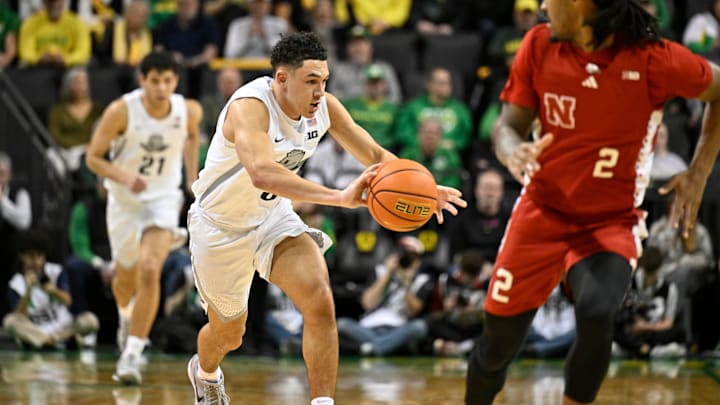Oregon Ducks Basketball Face Crucial Stretch in Big Ten Conference Play, NCAA Tournament Looms

In this story:
EUGENE – The No. 16 Oregon Ducks are expected to drop in the polls after suffering their third consecutive loss Sunday night against an unranked Nebraska team. This defeat came just days after losing to UCLA and falling to an 11-9 Minnesota squad. Oregon now holds a 16-7 overall record with a 5-6 mark in conference play, placing them ninth in the Big Ten standings. The loss to Minnesota was followed by a blowout defeat at UCLA and a home loss to Nebraska, highlighting the Ducks’ struggles to find consistency this season.
The Big Ten Tournament structure raises the stakes for the Ducks. The top four seeds receive a double bye, while the bottom three teams miss the tournament entirely. With just nine regular-season games remaining, Oregon is two games removed from either scenario. The Ducks currently sit two games behind a trio of teams tied for fourth place with a 7-4 record. However, oregon is also just two games ahead of three teams at 3-8—one of which would miss the tournament if it started today. Oregon Coach Dana Altman knows his team needs to figure things out fast.

"We're going to have to battle through it," Altman said. "We've got five on the road and four at home left; everybody's kind of bundled up, so it's just whoever plays well in February. We've traditionally played well in February, but this team's going to have to figure it out."
Oregon’s season started with historic momentum, winning its first eight games, including statement victories over No. 4 Alabama and No. 13 Texas A&M in the Players Era Tournament. But since then, the Ducks have been inconsistent. Oregon has found ways to win close battles against quality Big Ten opponents while also suffering surprising losses to lower-ranked programs. Shooting inefficiency has been a major issue. Oregon is hitting just 46% from the field and 33.1% from beyond the arc, with poor shot selection and stagnant ball movement contributing to their offensive struggles.
The Ducks now face a challenging stretch that could make or break their postseason positioning. Road matchups against Michigan and Michigan State could put them at risk of a five-game losing streak. After that, they return home to face Northwestern and Rutgers before traveling to Iowa and No. 17 Wisconsin. Home games against USC and Indiana will be tough, and the Ducks will close out the regular season at Washington. This stretch presents two possible outcomes. One, Oregon could play its way back into the Big Ten’s top four and secure a favorable NCAA Tournament seed, or they could slip further.

For now, Oregon remains safely in the NCAA Tournament field, but its seeding is slipping. Once projected as a two-seed, the Ducks risk falling further and losing the chance to play close to home in Seattle if their struggles continue.
Center Nate Bittle leads the Ducks in scoring, averaging 12.5 points per game. Having a player like Bittle who can stretch the floor, finish in the paint, and still be a threat from three is a major asset, but Oregon’s guards will need to step up down the stretch. Jackson Shelstad and Keeshawn Barthelemy, in particular, will play a key role in Oregon’s postseason push.
MORE: Ohio State Buckeyes Offensive Coordinator Chip Kelly Hired by Las Vegas Raiders, NFL
MORE: Dallas Cowboys Target Ra'Shaad Samples Staying With Oregon Ducks, Dan Lanning
MORE: Oregon Ducks Quarterback Dillon Gabriel Shines at Senior Bowl, Boosts NFL Draft Stock

Barthelemy and Shelstad have emerged as Oregon’s biggest perimeter threats, with Shelstad shooting 28.9 percent from three and 43.6 percent from the field, while Barthelemy is hitting 40.4% from deep and 41.6% overall. If both can find more consistency, the Ducks could become a much tougher offensive team. However, their effectiveness isn’t just about their own shooting, it also depends on the decision-making of the players around them, which has been lacking in recent games. Oregon is averaging 12.6 turnovers per game, a number that must improve if the Ducks want to succeed in the postseason.
"I tell you what. We’re a poorly coached team," Altman said after Oregon’s loss to Purdue. "That was—16 turnovers, leaving our feet, fundamentally not sound. The shot selection? Awful. Really disappointed in myself not being able to get our guys to execute what we wanted."

Shelstad and Barthelemy need to remain aggressive with their shot selection, but they also can’t force bad looks. That’s where Oregon’s offensive execution must improve. It can’t just be up to Barthelemy and Shelstad to create their own shots, their teammates need to be stronger with the ball and more disciplined in their decision-making. Better ball movement and smarter offensive possessions will be key to disrupting opposing defenses and creating open looks for their shooters. If the Ducks can clean up their offensive execution and limit turnovers, they still have the talent to turn things around. But with just nine games left, time is running out.
MORE: Chip Kelly Replacements For Ohio State Buckeyes: Penn State's Andy Kotelnicki?
MORE: Oregon Ducks Commit Tomuhini Topui Visits USC Trojans, Lincoln Riley
MORE: Top-25 Basketball Poll After Ranked Upset: USC Trojans, Michigan State Falls
MORE: Oregon Ducks Or Georgia Bulldogs To Land Nation’s No. 2 Recruit Immanuel Iheanacho?

Olivia Cleary, commonly known as Liv, is a fourth-year student at the University of Oregon. While pursuing a degree in journalism, Olivia has submersed herself in the world of Oregon athletics. Olivia is an intern within the athletic department. This role has provided her with a unique perspective as she has created relationships with staff, administrators, and student-athletes. Olivia is eager to share her insights and analysis on the Ducks and the broader world of college sports.